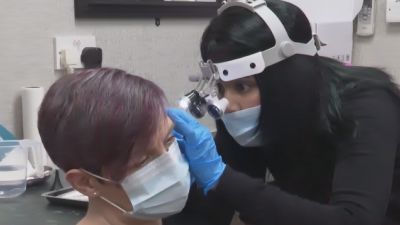Insight
Private clinic getting '30 enquiries a day' as patients struggle to access NHS ear wax removal

A private hearing clinic in Solihull says it is receiving around thirty enquiries a day from patients who need ear wax removal treatments.
Clinic director Attyyah Farhat says she's taken on many patients who say they have had difficulty accessing NHS services.
Ear wax removal is available on the NHS when it is considered 'clinically necessary' and may be provided by a GP surgery or another commissioned provider.
In the past, these procedures were readily available, but four years ago manual syringing of wax on the NHS was halted over safety concerns.
Many clinical commissioning groups were unable to cover the cost of alternative methods and some stopped offering wax removal altogether.
Attyyah, who runs the Ear and Hearing Clinic in Solihull, says: "We have seen a significant increase. We're probably getting around about 30 inquiries a day for people wanting earwax removal.
"They want it quite soon, or they've inquired at other locations and they cannot be seen for a good number of months."
According to the national hearing loss charity RNID, more than two million people in the UK require regular removal of ear wax to avoid hearing problems.
If left untreated, a build-up can also cause:
balance problems
greater risk of infection
social isolation
depression
Lizzie Jackson almost went completely deaf because of a build-up of ear wax.
She says she was unable to access an appointment on the NHS and it led her to attempt to remove it herself.
She says the pressure in her ears caused pain, discomfort and balance problems.
"The only thing was to self-treat for wax build-up so I put in special olive oil for softening ear wax, which I got from the pharmacy" explains Lizzie.
“The cotton wool that I placed at the entry to my ear canal to stop the olive oil from dripping out got stuck deep in my ear. I had to go to the hospital to get it removed."
"They eventually removed the ear wax, but I should have been able to access a practice nurse at my doctor's who could have solved the problem several weeks earlier.”
The NHS website states that ear wax usually falls out on its own, and patients should use medical-grade olive or almond oil in drips to clear the wax.
It says if symptoms have not cleared after five days, or if the patient's ear is completely blocked, then they should seek medical help from a pharmacist or GP.
"Not all GP practices remove ear wax but some can flush the wax out with water (ear irrigation) or suck the wax out (microsuction)", it reads.
It adds that these treatments are "usually painless" and patients "might have to pay to have them done privately".
Franki Oliver, Audiology Manager for the RNID, says many patients she speaks to are finding it difficult to access ear wax removal services on the NHS.
"Many people are being told to get wax removal privately or try and manage the wax themselves.
"We are concerned that if they're trying to remove it themselves that they might try unsafe methods, which could cause damage to the delicate structures of the ear."
An NHS spokesperson said: “NICE advises that manual ear syringing should not be carried out in general practice due to the associated risks of ear trauma and infection.
“Integrated Care Board (ICB) commissioning teams should ensure that GP practices are able to refer to appropriate local NHS services for removal, in cases where symptoms persist following self-care methods.”